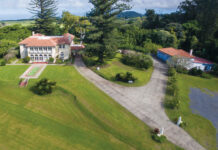Through that process, Cotter began to grapple with the conceptual divide between Eastern and Western modes of thought, and how that relates to healing. It is, he says, an ongoing challenge, indeed one that has lured him back to China more than a dozen times since training with Dr. Li.
In terms of treatment styles, the differences are striking. In the West, for example, water retention is treated with diuretic medication. Because Chinese doctors view edema as water stagnation, their intent is to release energy needed to move water through the body and to break blockage. That is accomplished through a combination of remedies, such as acupuncture, herbs, nutrition and Tui Na, a form of acupressure.
The key, says Cotter, becomes bridging those two approaches, since patients often use a combination of Western and alternative treatments. “I have to be able to talk to a doctor and talk doctor-medicine terminology. I can’t say we have a damp heat in the lower burner. I can’t say we have a wind invasion, but I can say we have an ulcerated colon.”
At Dragon’s Den, Cotter offers another service: helping patients determine the interface between herbal and pharmaceutical medications. Often, conventional doctors tell patients to stop taking herbs because they don’t know how they will react with prescription drugs. Cotter has studied this relationship.
His pharmacy falls under the “nutraceutical” category, an industry that has seen phenomenal growth over the last 30 years. Nutraceutical—a combination of the words “nutrition” and “pharmaceutical”—refers to the medicinal benefits of food, such as vitamins, minerals and herbs. According to Cotter, conventional medicines are typically derived from synthetic, petroleum-based substances that tend to stress the liver.
Staying abreast of new products can be challenging . . . and expensive. Dragon’s Den General Manager Matthew Hammond says the U.S. has yet to see many stores specializing in herbs because of how costly it is to obtain and ship them from other countries. Moreover, adds Joyanna, the research involved in staying current with new products, and determining which companies have used inorganic ingredients or fillers, is time intensive.
For most patients, finding a natural cure for an ailment is far preferable to a chemical one. This has held true through the years: the Cotters have watched their clientele develop from tie-dye-clad, bearded hippies to lawyers and businesspeople, and even conventional practitioners of Western medicine.





